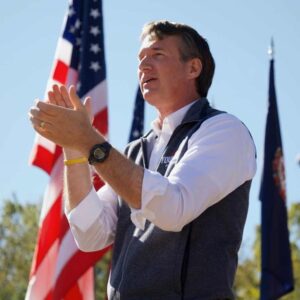 by Joe Fitzgerald
by Joe Fitzgerald
Deep in the hills of Southwest Virginia is a state Senate district where nobody works because the coal industry is increasingly mechanized. The district has all or part of eight counties. In Northern Virginia is a county where nobody works because they’re all employed by the federal government. The county includes all or part of eight state Senate districts.
Every four years, national political writers combine this into a cohesive entity called Virginia and use it as a bellwether for the presidential election that follows the state Senate election by one year, every single time. The state’s economics and politics are shaped by, among other things, the coal industry and the federal government (see above). The state’s boundaries are shaped by rivers, a bay, a mountain range, and a southern line that’s straight except for a zig-zag south of Abingdon caused by a drunken surveyor.
Most of the national political writers don’t know that our districts were drawn by the courts, our counties and cities are separate entities, and our precincts are drawn by processes that vary by district, county, and city. And every four years, regular as clockwork, they write about how the General Assembly races will impact the ambitions of George Allen, Jim Gilmore, Mark Warner, Tim Kaine, Bob McDonnell, Terry McAuliffe, or Glenn Youngkin for president, vice president, or U.S. senator.
Meanwhile, 30 percent of Virginia’s voters go to the polls, 40 if Trump’s president, and cast ballots based on guns, abortion, schools, highways, health care, education, sample ballots, or whether they saw the candidate at the grocery store. By the time you boil it down to the number of competitive districts and the margin of victory, less than half of one percent of Virginia’s five and a half million voters will constitute the bellwether that political writers ring every four years.
In 1984, with no local races on the ballot in Petersburg, and Reagan’s re-election a near-certainty, a managing editor had me write at least three stories about the race for mayor of Jarratt. If you can’t find it on a map, neither could most of our readers. Two hundred people might have voted. But it was the only race with a real contest. Similarly, Virginia is one of few states with elections in the off-off-off-year before the presidential year. There’s not a lot for national political writers to do, but I wish they’d do it somewhere else, or at least learn the difference between Washington County and the Washington suburbs.
The national political writers this week will write Youngkin-centric stories that ignore the efforts of everyone from Susan Swecker to Esther Nizer. And in four years, they will be back to write about the political ambitions of whoever is governor. Virginia’s voters, 30 percent of them, will go to the polls with no clue or concern about what the governor might be running for. After all, they didn’t see him in the grocery store.
Joe Fitzgerald is a former mayor of Harrisonburg. Republished with permission from Still Not Sleeping.

Leave a Reply
You must be logged in to post a comment.